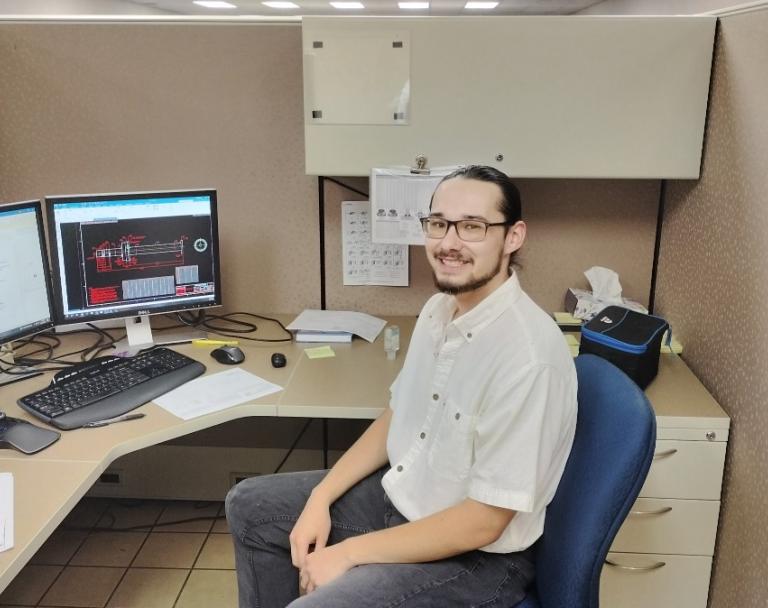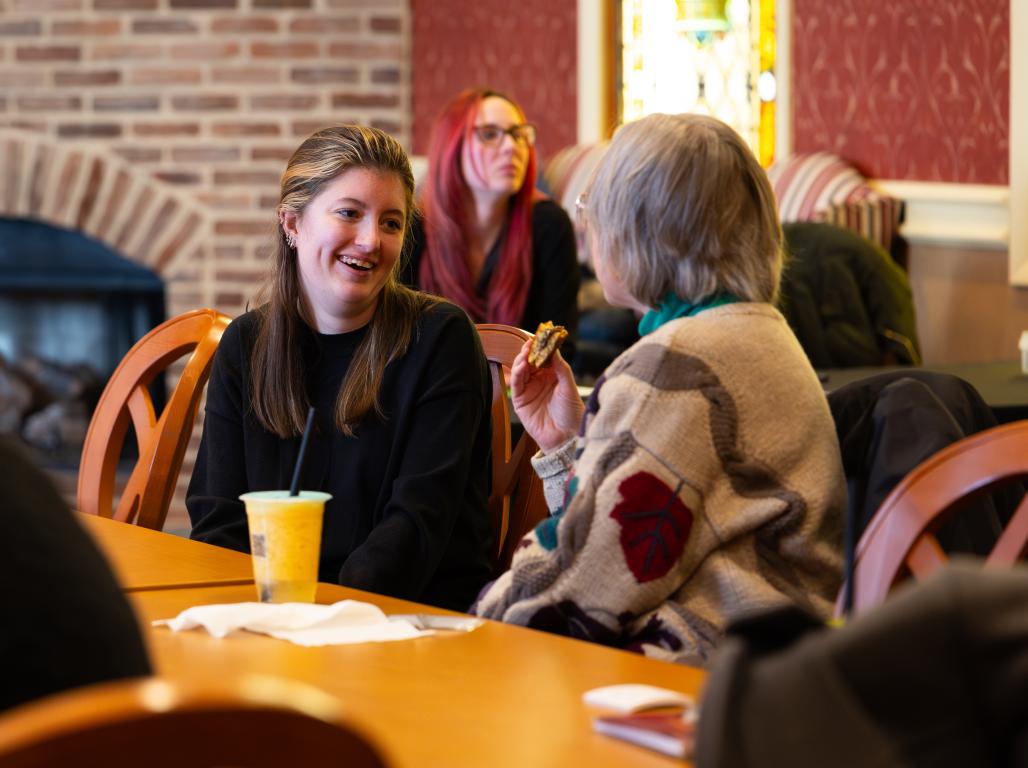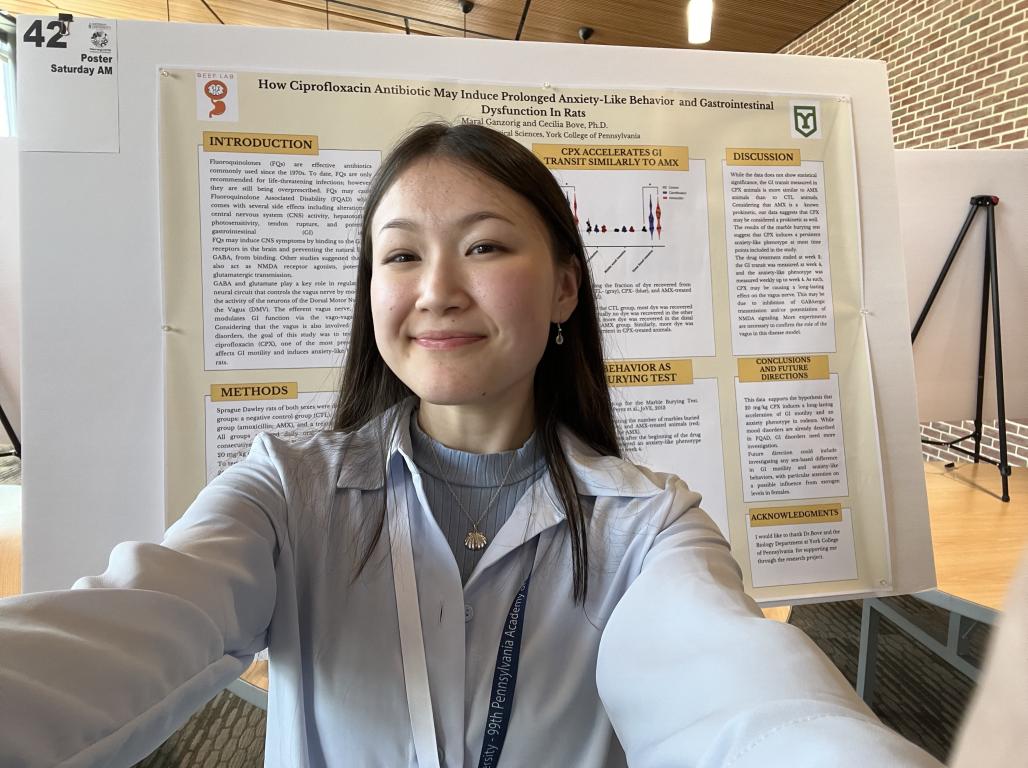Junior Mechanical Engineering Major’s Summer Focused on Sustainability Includes Co-Op and Trip to the Netherlands

At York College, students aren’t just reading textbooks and listening to lectures. They’re working on community projects, solving real-world problems, and using their education to effect change. In Designed for Action, we meet the students who are making an impact outside of the classroom.
Sustainability is a primary concern for Branden Goromaru ’25, and he got to spend his summer focusing on just that.
The junior Mechanical Engineering major (Lancaster, PA), spent his summer as an engineering co-op with American Hydro in York focused on designing and building hydroelectric turbines.
“It was nice to know my work was being used for green energy development,” he says.
He also got the chance to travel to the Netherlands to study sustainability in action.
Sustainability in action
All Engineering majors at York College are required to complete three co-ops or internships to graduate. Branden learned about co-op opportunities at American Hydro through career development sessions offered by the Engineering programs. He got to know a few of the managers at American Hydro, applied online, and was accepted.
During the co-op, Branden utilized the Computer-Aided Design (CAD) software NX to help the turbine team design, model, and draft parts, and assisted with any other tasks that came up whether they be from the mechanical engineering or CAD departments.
“This included revising and editing engineering drawings, designing shipping fixtures and containers for turbine shaft delivery,” he says, “and calculating bending stresses to ensure component designs fit within a factor of safety for stability and strength. I was also measuring and drawing parts found in the company's machine shop for inspection or machining, working with customer documentation and quality control teams to ensure product tolerances, and redrawing old hand-drawn engineering documentation in modern CAD.”
Branden enjoyed learning about the hydro industry and turbine design during the co-op. It was rewarding getting to see the actual work that will be used in these projects and powerplants, he says.
“It was really interesting to get to work in the same building as the manufacturing and fabrication, so I was able to see how everything is built and put together and physically hold or see some of the parts I was working on,” he says.
Focused on sustainability, Branden was also able to partake in a study abroad trip this past May to the Netherlands. A Graham Collaborative Innovation Fellow*, he applied for study abroad funding through the program.
“After almost a year of planning, I had the opportunity to travel to the Netherlands with four other students and a faculty advisor for 10 days,” he explains. “Everyone on the trip had their separate learning objectives to complete, but I was mainly focusing on the Dutch sustainability, specifically through their infrastructure, energy grid, and transportation, as well as some of their language.”
The group spent half their time in Amsterdam, where they took a personalized bike tour of the city with an urban planner who explained the city’s sustainability practices. They also learned about the concept of circularity and the Dutch usage of green architecture, as well as viewing sustainability in action via their Airbnb stay.
“We were able to learn about the concept of circularity that is currently being pursued in Amsterdam, which focuses on being independent and reusing resources, such as having an independent solar grid for a block of houses, gardens, and small farms to feed communities or composting food scraps for fertilizer,” he adds. “This related to our Airbnb, too, as we also stayed at a nature-based community containing a farm-to-table restaurant, a beekeeper, small farmland with produce, chickens, pigs, and much more. We learned about Dutch architecture and their usage of green architecture with the use of plants in or on buildings to assist in water storage and retention in times of rain or psychologically for the citizens compared to a barren gray city.”
Branden’s group also experienced Amsterdam’s public transportation system, which is less carbon-intensive than car-based transportation. They visited historical sites such as the Anne Frank house and other museums, and took a WWII walking tour around the city.
At the end of their trip, they went to a town called Enschede, where they met with members of the University Innovation Fellows (UIF) at the University of Twente.
“We learned all about their design lab, which was a large collaboration space intended to allow students to collaborate, prototype, and communicate with one another with many amenities and workspaces to allow for creativity,” Branden says. “We also attended a sustainability meeting/overview done by the University, going over their sustainability goals, accomplishments, and things they needed to do for the future, which inspired me to possibly make a similar database or presentation for YCP,” he explains. “The UIF students were helpful to speak to as well, because some other Graham Fellows and myself have applied for and are currently candidates to formulate a UIF team at York this upcoming semester. This university is also the meeting place for the UIF conference this upcoming spring, so it was amazing to get to meet some of the students ahead of time and possibly be able to return again.”
Setting the stage
Branden credits the success of his summer learning experiences partly to his training at York College, where he learned in class some of the concepts he put into practice during his co-op.
“Some of the helpful things that prepared me for this co-op include further learning about tolerances, dimensioning, screw layouts, and GD&T (Geometric Dimensioning and Tolerancing) in Intro to Mechanical Engineering. This helped me with understanding how to annotate machining documentation, along with the machine shop section of the course that gave me a better understanding of the processes needed to be done to complete certain parts,” he says. “I would also say courses such as Statics or Strength of Materials helped in being able to design load-bearing equipment and doing calculations to prove it fits within a factor of safety, such as doing bending stress equations on the I-beams being used in some of the turbine shaft shipping fixtures and ensuring they would not bend, buckle, or fail due to the weight of the shaft.”
Additionally, his trip to Amsterdam helped him apply sustainability practices and principles to a real-world setting, and see it done successfully in action.
“We were able to learn, experience, and see a lot while on the trip, and I hope to be able to apply many of the sustainability principles and applications I learned to either York College or my career as I progress further,” he adds.
After graduating, Branden wants to work somewhere in the field of sustainability.
“I want to work on the broad scope of how to use engineering, design, and updated practices to create a more equitable, economically viable, and environmentally friendly world, whether that be through Sustainability Engineering, consultancy, or somewhere in the renewable energy field,” he adds. “I plan to hone in on this as I continue through college and through my co-op opportunities, as well as any possible study abroad opportunities such as with my trip to the Netherlands.”
York College works with Engaged Scholars and Graham Collaborative Innovation Fellows From Day One to help them form their dreams into a personal mission, which is supported with financial and other assistance. They leave York College with a record of achievement that will gain the attention of employers, graduate schools, or others who provide entry into the next step in the extraordinary lives they imagine for themselves.



